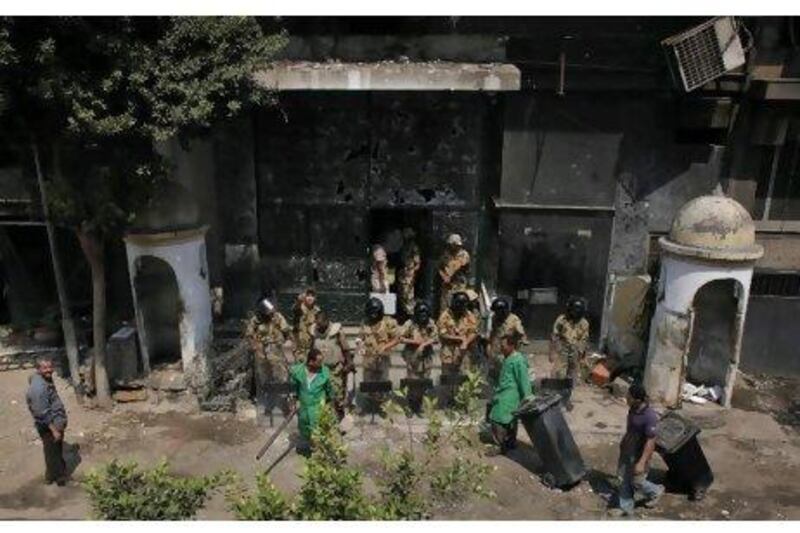TEL AVIV // Israel is facing a new reality in the Middle East in which it has few friends and its policies are under escalating attack.
Its relationship with Egypt is the most strained since the two countries signed an historic peace pact in 1979. Its ambassador in Cairo left Egypt on Saturday after protesters stormed the Israeli embassy.
Its one-time sturdy alliance with Turkey is crumbling, with Israel's ambassador in Turkey expelled 10 days ago.
As if that were not enough, Israel also now faces a possible United Nations recognition of Palestinian statehood this month.
Yesterday Ehud Barak, the centrist Israeli defence minister, urged the predominantly right-wing government to hold a special session to debate how to to reverse the slide to greater isolation.
"There is a wide picture forming around us that includes what happened with Turkey, what is happening with Egypt and what is happening with the Palestinians," Mr Barak said.
"These are events that are not in our control, but we can certainly influence the way we will be positioned against them."
Mr Barak said Israel's position may suffer a further blow because its ties with the US, its staunchest ally, are "deteriorating".
Washington also has close relations with Turkey and Egypt.
As early as March, just weeks after Hosni Mubarak - a longtime Israeli ally - was removed as Egypt's president, Mr Barak had warned that Israel faces a "political tsunami" amid the pro-democracy revolutions in neighbouring Arab states and the deadlock in peace talks.
Friday's storming of Israel's embassy in Cairo, which had forced the Israeli ambassador to flee Egypt, was sparked by anger over the country's killing last month of five Egyptian soldiers. Israel had apologised for the incident but Egypt has called its response insufficient.
The Cairo riots took place just a week after Turkey expelled top Israeli diplomats over Israel's refusal to apologise for its killing of nine Turkish activists on board a Turkish-flagged aid ship that tried to break Israel's naval siege of the Gaza Strip in May 2010.
For some older Israelis, television footage of the Cairo embassy riots and evacuation was reminiscent of Iran's 1979 Islamic Revolution, when Israel withdrew its diplomats from its Tehran embassy in a move that ended its 30-year alliance with Iran and was the start of the enmity between the nations that endures to this day.
Now, some Israeli officials fear that Egypt and Turkey may become more Islamist, and in turn develop more hostility towards Israel and eventually end all their ties with the Jewish state.
Since Iran's revolution, Israel has increasingly grown to view Iran as its archenemy with nuclear ambitions that must be curtailed at any price, and it has relied on alliances such as those with Egypt to build a regional counterforce to Iran.
Mr Netanyahu and other government ministers have publicly warned that the Arab Spring may result in neighbouring Arab countries installing more fundamentalist regimes.
"Radical Islam is threatening moderate Arab regimes, and is leading to the firing of rockets and missiles on Israeli citizens," Mr Netanyahu said in a briefing late on Saturday.
"The threat will be immeasurably bigger if radical Islam obtains weapons of mass destruction."
Yesterday, Egypt's Muslim Brotherhood demanded a "revision" of relations with Israel and rejected heightened security measures imposed after the storming of the Israeli embassy.
Israel "must have received the message and understood that Egypt has changed, the entire region will change, and there is no room left for its arrogance and aggression," the Islamist group said.
The worsening relations with neighbours are prompting some commentators to call for the resignation of Mr Netanyahu, accusing him of hurting Israel's standing with a hard-line approach that led him to reject the demand of Turkey and Egypt to apologise for the killings.
Analysts also say the US and other allies have grown disappointed with how the premier's repeated statements on his hopes to restart the peace process do not match actions such as settlement expansion that are angering the Palestinians.
Yoel Marcus, a leading commentator with the Israeli daily newspaper Haaretz, said Mr Netanyahu's unyielding approach and the doubts allies have in his credibility are undermining Israel at a time when it needs to appear strong ahead of the UN vote on whether to recognise Palestinian statehood.
"Bibi is getting on the nerves of the entire world," wrote Mr Marcus. "And that is because of four words: they don't believe him. Israel is marching to the UN General Assembly weak and hated, under very difficult negotiating conditions."





